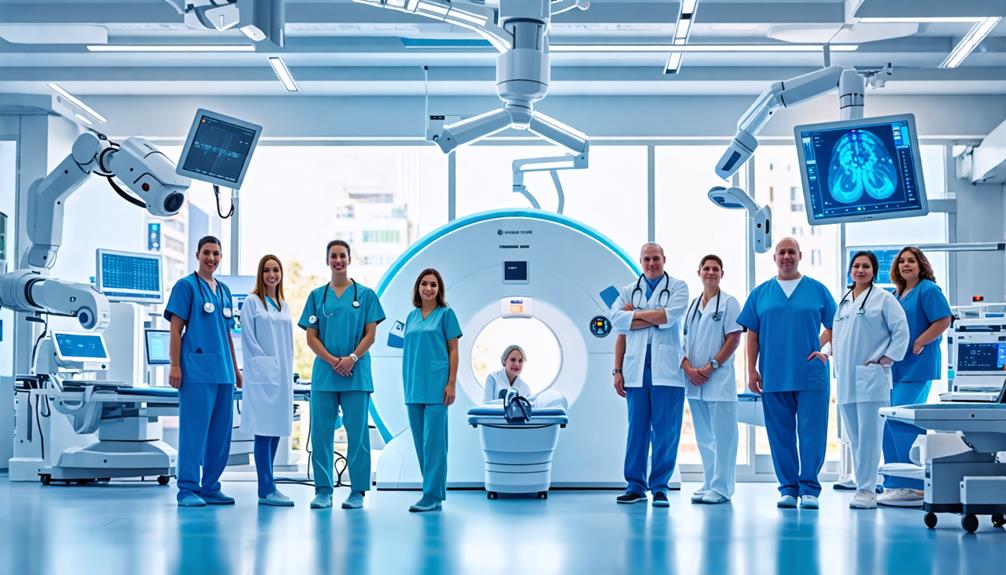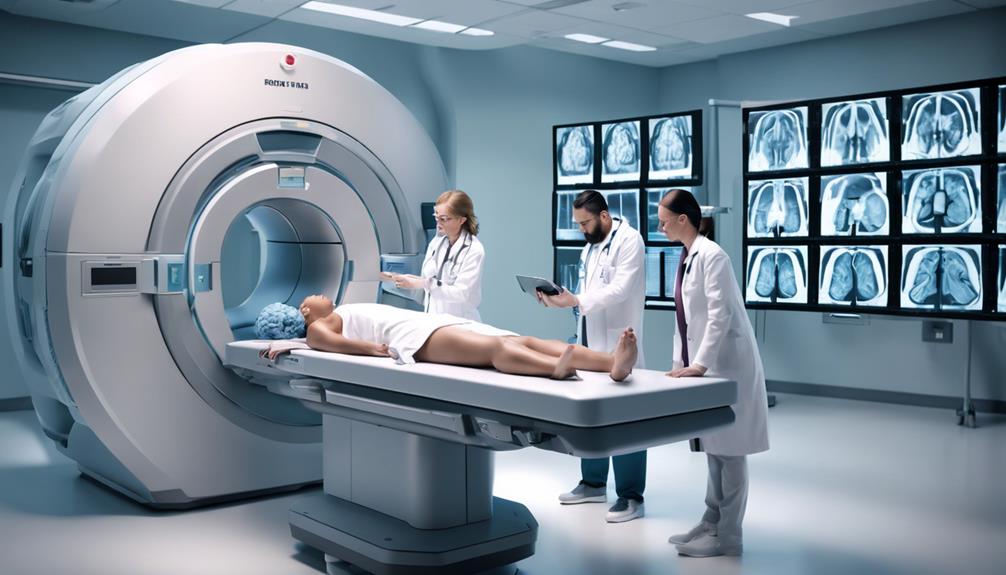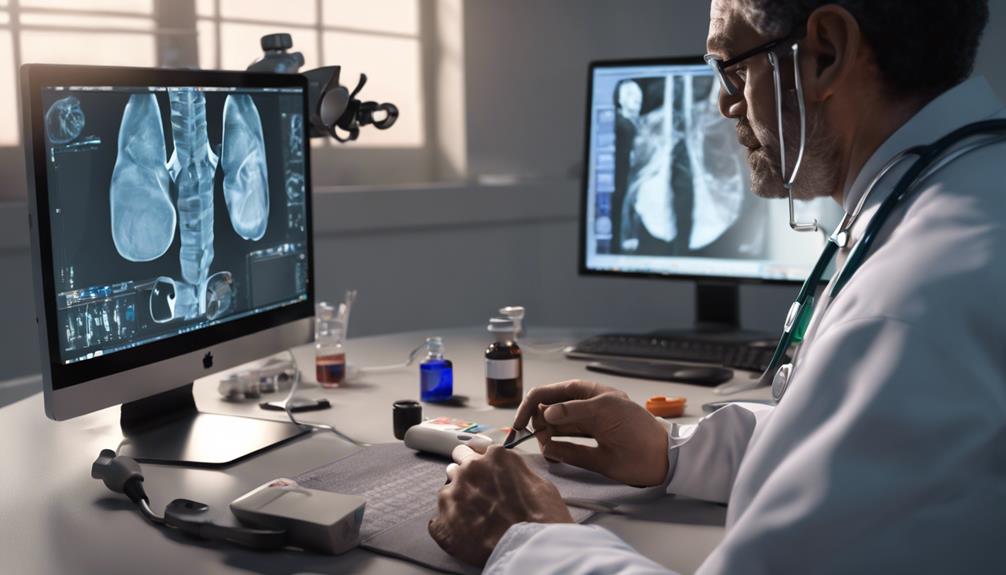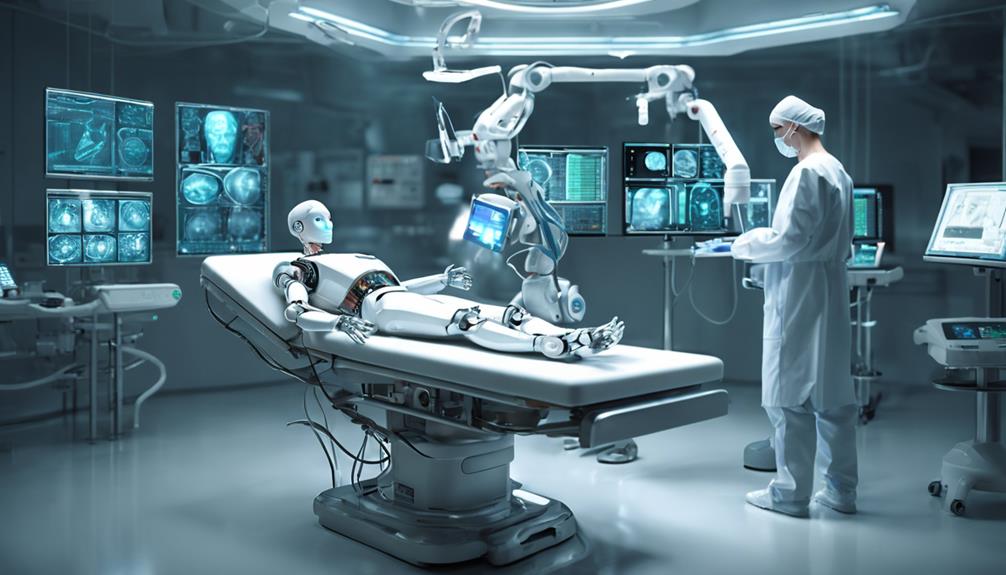
Deciding which medical technology field is best for you depends on your interests and where you see the biggest impact. If you're fascinated by cutting-edge procedures and robotic assistance, innovations in medical robotics may captivate you. Perhaps the rapid advancements in biotechnology, where gene editing and personalized medicine are transforming healthcare, align more closely with your passion. Or maybe you're drawn to enhancing patient care through AI and telemedicine, which have revolutionized how healthcare is delivered, making it more efficient and accessible. Each field offers unique opportunities to innovate and change lives; exploring these areas further might unveil where you can make your mark.
Exploring Imaging Technologies

Imaging technologies like MRI and CT scans revolutionize how doctors diagnose and treat diseases. When you're facing a mysterious health issue, these tools are pivotal. They allow a peek inside your body without a single incision, revealing details from bone fractures to abnormal growths.
Imagine you've got a persistent headache; an MRI could show whether it's due to a benign cyst or something more serious, guiding your doctor's approach to treatment.
CT scans, on the other hand, are phenomenal for acute conditions. If you're rushed to the ER following a car accident, a CT scan can quickly assess for internal injuries, ensuring you get immediate care. They're also invaluable in monitoring the progression of chronic diseases, helping to adjust treatment plans as your condition evolves.
These technologies aren't just about identifying problems; they're integral in preventive care. Regular scans can detect early signs of disease, often before you experience symptoms. This early detection can be a game-changer, especially for conditions like cancer, where early treatment can significantly improve outcomes.
Advances in Biotechnology
Biotechnology is transforming medicine, from gene editing to regenerative therapies that might one day cure diseases you fear most. Imagine a world where your genetic material can be precisely edited to remove predispositions to conditions like cancer or Alzheimer's. That's not science fiction; it's the potential reality offered by CRISPR technology. This tool allows scientists to cut and replace parts of the DNA sequence, making gene therapy more accurate and less risky.
You might also find stem cell research particularly promising. These cells have the unique ability to develop into different types of cells in the body, offering new ways to treat injuries and chronic diseases. For instance, they're being used to regenerate damaged tissues in conditions such as heart disease and diabetes, potentially reducing the need for transplants.
Moreover, biotechnological advancements are making personalized medicine more accessible. You could soon have medications tailored just for your genetic makeup, minimizing side effects and maximizing effectiveness. This shift towards customized healthcare isn't just a trend; it's the future of medicine, ensuring treatments aren't only effective but also safer and more suited to your individual health needs.
The Rise of Telemedicine

As we explore further innovations in medical technology, the rise of telemedicine has become a game changer in how you receive healthcare. You're now able to consult with doctors from the comfort of your home, using just your smartphone or computer. This shift not only saves you time and travel costs but also broadens access to specialists you mightn't have easily reached otherwise.
Telemedicine's impact is particularly significant in rural areas, where medical facilities may be scarce. You can receive consultations and follow-up care without the need for long trips to a hospital. It also supports chronic disease management by making regular monitoring more convenient and immediate, enhancing your ability to manage conditions effectively from home.
For healthcare providers, telemedicine offers tools to better track patient health and tailor treatments. It's not just about video calls; it includes sharing and analyzing medical records in real-time, ensuring that you get the most informed care possible.
Moreover, the adoption of telemedicine has accelerated due to the COVID-19 pandemic, proving its effectiveness and pushing regulatory bodies to relax previous restrictions, which has further integrated it into mainstream healthcare. It's clear that telemedicine isn't just a temporary solution—it's reshaping the future of medical consultations.
Innovations in Medical Robotics
Moving into the field of medical robotics, you'll find technologies that significantly enhance surgical precision and patient recovery times. Robots like the da Vinci Surgical System allow surgeons to perform complex procedures with more control than traditional techniques. You're looking at machines that can manipulate tiny instruments inside the body through minuscule incisions. This not only reduces the risk of infection but also cuts down on healing time, letting you get back to your life quicker.
Beyond surgery, robotics is revolutionizing rehabilitation. Robotic exoskeletons help you regain movement after severe injuries or strokes. These devices support your body and assist in performing motions, gradually retraining your muscles and nerves to recover their functions. Imagine regaining the ability to walk or hold a cup, thanks to a machine that adapts to your body's needs.
Moreover, robotic assistance extends into more routine medical practices. Automated systems now handle tasks like dispensing medication or transporting supplies within hospitals, streamlining operations and reducing human error.
Wearable Health Devices

You'll often find that wearable health devices are transforming the way we monitor and manage our health daily. These gadgets, ranging from fitness trackers to advanced sensors, provide real-time insights into your physical well-being. They track everything from your heart rate and sleep patterns to steps taken and calories burned, making health management more interactive and informative.
Imagine you're trying to improve your cardiovascular health. A wearable device can monitor your heart rate during various activities, providing data that helps you optimize your workouts. Perhaps you're monitoring sleep; these devices can track sleep stages, helping you understand what affects your rest. This isn't just about having information but about understanding your body better and making informed decisions about your health routines.
Moreover, these devices often connect to apps or software that analyze the data, offering personalized recommendations. You'd receive alerts, for instance, if your activity levels drop or if there's a notable change in your heart rhythm.
This connectivity also means you can share this data with your healthcare provider, enhancing the dialogue between visits and potentially catching health issues early.
Breakthroughs in Genetic Testing
While wearable health devices provide crucial insights, breakthroughs in genetic testing are redefining how we understand and treat genetic disorders. You're now entering a world where your DNA can unlock secrets to your health that were once hidden. Imagine knowing your risk for certain diseases long before symptoms appear. That's what the latest advancements in genetic testing offer.
You might've heard about CRISPR, a technology that's not just about identifying genes, but also editing them. This means if you're at risk for a genetic disorder, there's potential for actual genetic correction, shifting from mere treatment to potential cures. It's a game-changer, offering hope where there was resignation.
Moreover, genetic testing isn't just about preventing illness. It's also enhancing personalized medicine. You can now receive treatments tailored specifically to your genetic makeup, reducing the trial and error that often comes with medication management. This tailored approach not only improves efficacy but also minimizes side effects.
The influence of these breakthroughs extends beyond individual care. They're transforming public health strategies, enabling more precise and effective interventions.
As you navigate this exciting field, you're not just a passive participant; you're an empowered individual armed with knowledge that can profoundly influence your health decisions.
Artificial Intelligence in Healthcare

Artificial intelligence is revolutionizing the healthcare industry, enabling faster, more accurate diagnoses and personalized treatment plans. As you explore the medical technology fields, it's hard to overlook the impact AI has had. It's not just about streamlining processes; it's transforming patient care.
You've likely heard about AI algorithms that can interpret medical images. These tools assist radiologists by identifying subtle patterns that the human eye might miss. They're becoming indispensable in diagnosing diseases from X-rays, CT scans, and MRIs. But the benefits don't stop there. AI systems are also predicting patient risks by analyzing vast amounts of data, from genetic information to lifestyle choices.
Imagine a system that anticipates a patient's health trajectory and suggests preventive measures. That's what AI is doing today. It's helping doctors tailor treatments to individual needs, cutting down on trial-and-error methods. This not only improves outcomes but also reduces healthcare costs significantly.
Moreover, AI-driven chatbots are providing 24/7 support to patients, answering health queries, and ensuring continuous care. It's clear that AI isn't just an auxiliary tool; it's a transformative force.
As you consider which field might be best, think about the roles AI plays—its scope is vast and its potential, immense.
Developments in Nanomedicine
Nanomedicine is rapidly advancing, offering groundbreaking methods to target diseases at the molecular level. Imagine tiny robots, smaller than a cell, coursing through your bloodstream, programmed to seek out and destroy cancer cells without harming healthy tissue. That's the promise of nanomedicine. It's not just science fiction; it's becoming a reality, changing how you might receive treatment in the future.
You're also seeing nanotechnology used for drug delivery systems that are more effective and less invasive. Traditional chemotherapy, for instance, can be grueling, with drugs indiscriminately attacking cells throughout your body. Nanomedicine, on the other hand, uses nanoparticles to deliver drugs directly to the tumor site, minimizing side effects and improving recovery times.
Moreover, nanomedicine isn't limited to cancer treatment. Researchers are exploring its potential in regenerative medicine, such as healing damaged tissues and organs using nanomaterials that can mimic or stimulate cellular structures and functions. It's also paving the way for better diagnostic tools that can detect diseases like Alzheimer's earlier than ever before.
This field's rapid development might soon offer you personalized and precision medical treatments that were unthinkable just a few years ago. As you look into the future of healthcare, nanomedicine is a field ripe with potential and poised for significant breakthroughs.
Ethical Considerations in MedTech

You must consider several ethical issues as medical technology evolves rapidly. As you delve into the world of MedTech, one primary concern is patient privacy and data security. With advancements like electronic health records and telemedicine, vast amounts of personal data are accessible online. You've got to ensure that these technologies adhere to stringent security protocols to protect patient information from breaches.
Another ethical consideration is the impact of new technologies on healthcare inequality. You might notice that cutting-edge treatments often come with high costs, potentially limiting access for economically disadvantaged groups. As a professional in this field, you must advocate for policies that increase accessibility and reduce disparities in healthcare availability.
Consent is also critical, especially with the rise of AI and machine learning in diagnostics and treatment plans. You need to ensure that patients are fully informed about how their data is used and the potential risks involved. Transparent communication is key to maintaining trust and upholding ethical standards in healthcare.
Lastly, consider the long-term implications of implantable and wearable devices. While they offer significant benefits, you should also think about issues like dependency, long-term effects on health, and personal autonomy. Balancing innovation with ethical responsibility is crucial as you navigate your career in MedTech.
Frequently Asked Questions
What Are the Typical Salaries in Different Medical Technology Fields?
You're curious about the typical salaries across medical technology fields. They vary widely, with biomedical engineers and clinical laboratory technologists often earning differently based on experience, location, and the complexity of their specialties.
How Do I Start a Career in Medical Technology?
To start a career in medical technology, you'll need to earn a relevant degree, gain certifications, and complete internships. Networking and staying updated on industry advancements are also crucial for your success.
What Are the Best Universities for Studying Medical Technology?
You'll find top programs at Johns Hopkins, MIT, and Stanford. They offer cutting-edge resources and research opportunities that can significantly boost your career in the medical technology sector.
What Are the Work-Life Balance Considerations in Medtech Careers?
You should consider work hours, on-call demands, and stress levels in medtech careers. Each role differs, so it's crucial to align your career choice with your personal work-life balance priorities.
How Does Cultural Diversity Impact Medtech Development and Deployment?
Cultural diversity significantly influences medtech development and deployment by ensuring products meet varied global needs. You'll find that diverse teams bring innovative solutions, making technologies accessible and effective across different cultural contexts.
Conclusion
As you explore the vast landscape of medical technology, remember that each field offers unique benefits.
Whether it's the precise insights from imaging technologies, the personalized solutions of genetic testing, or the accessibility of telemedicine, the best field really depends on your interests and needs.
Consider how these advancements can impact patient care and ethical practices.
Choose the field that aligns with your passion for innovation and your commitment to improving health outcomes.






